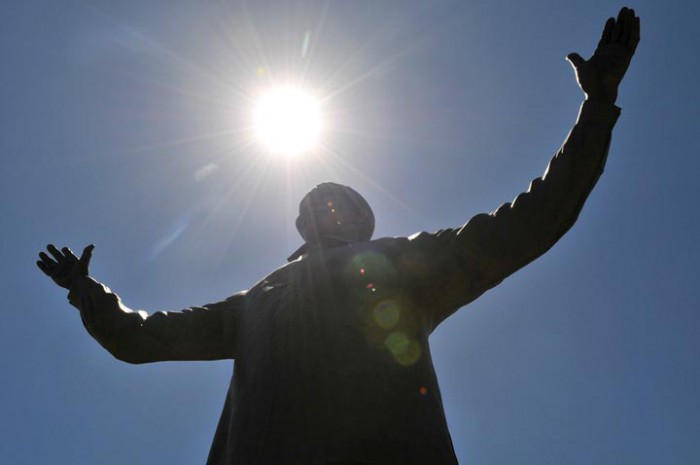As South Africans prepared to go to the polls Wednesday in the Republic’s fifth democratic national election since its first in 1994, I sat here in Chicago – 9,000 miles away and seven hours behind – keeping up with the news over a cup of tea and a heap of quickly-disappearing buttermilk rusks, South Africa’s crunchy pastry perfect for dunking.
It’s been nearly three months since I returned from South Africa, but my experiences from six weeks split between Cape Town and Pretoria are on my mind nearly every day.
For champions of democracy, students of emerging powers, advocates for Africa or simply observers of politics, this is an exciting moment as South Africa marks its 20th year of true democracy.
South Africa has just gone through a competitive election to determine the balance of power in Parliament – and, by extension, the President (currently Jacob Zuma). This is a young democracy and – some calls for constitutional changes notwithstanding – a stable one with impressive protections for civil rights of all people (including for same sex couples to marry).
It’s also a democracy at a crucial moment, with troubling economic indicators flashing on the horizon. Tensions and competing visions are a natural part of democracy, though, and South Africa’s vigorous yet peaceful election has dispelled some doubts about democracy’s future in the still-early days following the death of the inspiring, unifying Nelson Mandela.
During part of my time in South Africa, I had the privilege of supporting public affairs projects with the enterprising team at the British High Commission in Pretoria, which allowed me to witness firsthand some of what makes South Africa such a fascinating place at this moment in particular:
- A marker event in South African politics is the annual opening ceremonies of Parliament, based in picturesque Cape Town. It’s a series of events similar in pomp, circumstance and significance to our State of the Union Address in the US, or of the State Opening of Parliament in the UK. A coinciding tradition in South Africa is the British High Commissioner’s ‘Eve of Parliament’ reception, hosted at the High Commissioner’s impressive Residence in Cape Town. This year’s reception was an opportunity to celebrate the Rainbow Nation’s 20 years of democracy: to appreciate how far the nation has come since those difficult days leading up to 1994 and all that has transpired since – but more importantly by looking toward the future. Indeed, the United Kingdom is celebrating this milestone with South Africa with a program – branded as Vision 20/20 – of 20 partnerships for the future building on the already-extensive people-people links in areas including the arts, business, culture, education, science, sports and technology. 600 South African leaders in government, business, media and civic life were in attendance, including Thuli Madonsela, the public protector who TIME has just named one of the 100 most influential people in the world.
British High Commissioner Judith Macgregor celebrating 20 years of democracy in South Africa at the Eve of Parliament reception.
- South Africa, as a member of the Commonwealth of Nations, will participate in the 2014 Commonwealth Games in Glasgow, Scotland this summer. The Queen’s Baton Relay, drawing attention to the Games and promoting Commonwealth values, was ushered throughout the nation on its tour to all 70 participating Commonwealth countries and territories. Helping to document the journey of the baton – which carries a private message from Her Majesty The Queen – as our motorcade slowly made its way through iconic bits of Johannesburg (Soweto, Soccer City, the Apartheid Museum) with veteran athletes taking turns carrying the baton, and schoolchildren serenading the delegation, was a highlight which I will never forget.
- The UK Government’s commitment to ending the illegal wildlife trade is a complex but resonant issue in South Africa, where 80% of Africa’s rhinos live – albeit at great risk of poaching, with one killed by a poacher every 10 hours. Unfortunately, poaching is lucrative, illegally generating more than $19 billion annually. Through government and civil society, South Africans are taking action, and youth are particularly passionate activists for preserving the nation’s natural wonders. Some of the most talented and uplifting students showcased their projects to protect the rhino at an event hosted by High Commissioner Judith Macgregor just one week before Foreign Secretary William Hague convened world leaders to agree actions to stem the illegal wildlife trade.
Students and civic leaders shared their passion for protecting South Africa’s wildlife, particularly the iconic rhino. One rhino is poached every 10 hours.
If my glimpse of South Africa’s tremendous assets – its youth, infrastructure, creativity, natural resources, wildlife, natural tourist appeal (particularly around the oasis that is Cape Town), democratic values – was at all representative of the reality, the best days are ahead for the Rainbow Nation, and indeed its partnership with the UK. I, for one, will be back sooner rather than later. After all, I’ve run out of rusks!

